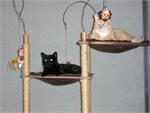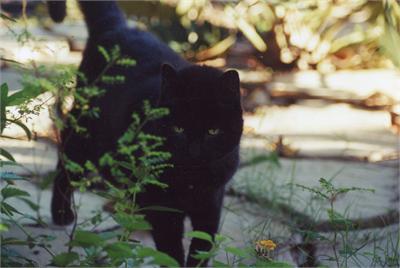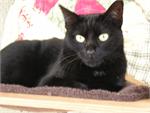

 Stella and Simon Tandem Hammocks Cat Condo
|
Home > Raw Feeding Made Simple
| | |
|
Raw Feeding Made Simple
What is the Goal?
The goal is to feed your carnivorous
|
“Matching your pet’s diet as closely as possible to their ancestral diet is essential if you want a healthy, thriving cat or dog.” Dr. Karen Becker
|
companion animal as close to nature’s recipe for good health as possible. If left to fend for themselves, our pets would eat a balance of the essential amino acids, vitamins and minerals they need for optimal health. To achieve this for them we strive to create the diet that our pets would instinctively eat if given the opportunity.
It helps to understand the basics of raw feeding. Once you feed your pet raw meals for a few weeks, you will get into a routine and it will become second nature.
Supplying your pet with good nutrition is as easy as feeding yourself.
Basic Raw Food Diet Guidelines:
•Eliminate Biologically Inappropriate Foods (i.e. grains and starches)
There is no minimal carbohydrate requirement for our carnivorous
companion animals. Energy is supplied through food sources that
are bio-available to their carnivorous systems; through protein
and fat. An excellent paper on this subject is offered by Carissa
Kuehn. See Myths About Raw Feeding below. According to Waltham Book
of Dog and Cat Nutrition (2nd edition, 1988) “There is no minimal
dietary carbohydrate requirement for either the dog or the cat.
Based on investigations in the dog and with other species it is
likely that dogs and cats can be maintained without carbohydrates
if the diet supplies enough fat or protein from which metabolic
requirement for glucose is derived.” Foods such as rice, oats,
wheat, corn and soy cause inflammation, nutrient uptake roadblocks,
and metabolic stress for our pets.
•Transition your Pet’s Diet to a Raw Diet in a Sensible Manner
•Select Quality Meat Sources
•Offer a Wide Variety of Animal Proteins
•Keep Calcium intake higher than Phosphorus – boneless meats are high
phosphorus. A source of Calcium should be added, preferably ground
bone
•Provide Omega 3’s regularly
•Follow Safe Handling of Raw Food Measures
•Give up the “Complete Meal” Concept
The key to good nutrition for any species is eating a broad variety of biologically appropriate foods in appropriate quantities.
In order to stay healthy our carnivorous companion animals require the living enzymes, unadulterated amino acids, and other vital nutrients found in raw meat. A diet that closely resembles their instinctive eating habits will strengthen the immune system and very likely return them to health.
Basic Ingredients for a Wholesome RAW Diet:
A raw whole-prey diet is intended to mimic the approximate percentage of meat, organ and bone that the wild carnivore eats. Suggested percentages are guidelines and based solely on our research and years of experience.
The Three Primary Daily Foods:
•Muscle Meat with Fat - approximately 80% of daily rations
•Organ Meat - approximately 10% of daily rations
•Edible Bones – 7% to 13% of daily rations as tolerated
Other Essential and Beneficial Foods and Supplements:
•Tripe -15% to 18% of overall diet
•Eggs – Once a week, preferably raw, the white and the yolk
•Necks – Up to 10% of overall diet as tolerated
•Vegetables and Fruits – For dogs: 1½ % of diet; about 1/2 to 1 tbsp
of select vegetables per pound and a half of ground raw meat-
organ-bone and an occasional select fruit treat. It is said
that cats do not metabolize plant based foods
•Recreational Bones – Several times a week for 20 to 30 minutes
•Add Calcium to balance Calcium/Phosphorus Ratio when feeding 
boneless meats - Use ground carcass (bone with
most of the meat removed) or if need be pure Bone
Meal as an alternative
•Omega 3 Fatty Acids - Sardines and the deep
water fish like salmon, and mackerel. A daily
Omega 3 supplement is also advised. See Krill
•Taurine - Supplement your cat’s raw diet with
Taurine. Cats cannot produce this essential amino
acid
Pay attention to your animal companion's health: weight, energy level, skin condition, odor, coat quality, stool consistency and frequency, and oral health.
Hooch waiting for his wholesome raw meal … YUM!
Click Here to Read or Print this Full Report Raw Feeding Made Simple
Links for Your Further Reference
An excellent work by Carissa Kuehn: Carissa holds a BS degree in Zoology and Biology with concentration in Anatomy and Physiology. Here she shares years of research on her Myths About Raw Feeding Pages. http://rawfed.com/myths/
What You Need To Know About Dog and Cat Nutrition, by Kymythy R. Schultze, Clinical Nutritionist and Animal Health Instructor http://www.kymythy.com/articles03.html
Feline Nutrition Education Society http://feline-nutrition.org/nutrition
Diet guide for domestic dogs and cats, by Tom Lonsdale, Veterinary Surgeon http://www.rawmeatybones.com/diet/exp-diet-guide.pdf
Nutrient Composition Of Whole Vertebrate Prey (excluding fish) Fed In Zoos, by E. Dierenfeld, PhD, H. Alcorn, BS, and K. Jacobsen, MS.
See pages 12 and 13 for mineral content of whole-prey. http://www.nal.usda.gov/awic/zoo/WholePreyFinal02May29.pdf
“With Taurine and cats, a little excess is definitely preferable to not quite enough.” Tracy Lord, DVM
http://www.vetlord.org/taurine-is-essential-for-cats/
Disclaimer: By utilizing this website you express your consent to our Disclaimer. Unless otherwise noted, the contents of our website and marketing materials are based upon the research and opinions of Grateful Pet, our business partners and reference materials. We are not licensed veterinarians, physicians, or nutritionists. The information is not intended to diagnose or prescribe or to replace a relationship with a qualified health care professional and it is not intended as medical or nutritional advice. It is intended as a sharing of knowledge and information from the research and experience of the Grateful Pet team. We encourage you to make your own health care decisions for your pet based upon your own research and your personal knowledge concerning your pet. If you use the information on this website to make decisions for your pet’s health or your own health, Grateful Pet assumes no responsibility for such decisions. We provide insight, high quality food, supplements, and gentle remedies and recommend seeking advice from a qualified, nutritionally oriented health care provider who has thoroughly researched your pet’s health.
| |
| | |
|
Notices
Articles of Interest
Look at what people are saying...
Resources
Photo Gallery
Pawsitively
Inspiring
RECIPES
Eggshell
Eggnog
Toppers
Veggie Puree

|
|